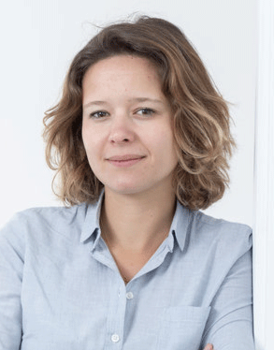Alice Magand
Consultant in Inclusive Business

The responsibility towards the most vulnerable is collective.
Alice started her career in the civil engineering sector, managing teams on site on water and infrastructure projects. As an engineer, she worked in multiple countries from Jamaica to the United Kingdom, engaging with public and private partners from over 30 nationalities.
Seeking more impact in her professional life, Alice joined the On Purpose Associate Programme during which she had the opportunity to work for Phitrust Partenaires, a social impact investment fund and Innovafeed, a biotechnology start-up company. Convinced that change at scale needs to happen within and through the private sector, Alice decided to join Hystra in 2018 as a senior consultant.
Since she joined Hystra, a hybrid consulting firm that works with business and social sector pioneers to design and implement hybrid strategies, innovative business approaches that are profitable and eradicate social and environmental problems and require to combine the insights and resources of business and citizen sectors. Alice has worked on fostering the deployment of inclusive businesses in the private sector, supporting both public-private partnerships and multinational corporations, notably in the fields of last mile distribution and access to nutrition.
She has been involved in the Inclusive and Social Business Certificate since 2019.
During this very special time of the Covid-19 crisis, we have asked her some questions about her activity, her vision about the future of a more inclusive economy.
At the time, when the most vulnerable people suffer the more, what—do you think—should become a priority for governments or companies (in France or around the world)?
We strongly believe that everyone as individuals, corporates or governments should do what they can at their level. For businesses, this means thinking about how they can best serve their customers in these complicated times. The responsibility towards the most vulnerable is collective. Some social businesses have completely stopped operations during the crisis; some truly did not have a choice, but others might have been paralyzed (as many were beyond social businesses!) by fear of the unknown. On the other hand, some social businesses managed to reinvent their business models to guarantee service to their customers. For example, Ecofiltro, a social business that sells water filters in Guatemala, managed to set-up an online platform and a same-day home delivery system in just a few days. This reactivity triggered their best month ever in terms of sales, and they supplied their customers with access to drinkable water even when all shops were shut down.
According to you, why and how social and inclusive business is a response to one of the challenges of our times and could contribute to “le monde d’après”?
More than ever, there is a need for models that serve the ones who need them the most. The crisis shows us that having a resilient model is key to get through it. One way of being resilient is to voluntarily diversify one’s activities to reach different customer segments (e.g.: different income levels, urban and rural…). This diversity should be built on a business rationale but it can also be a way to leave no one behind in accessing life-changing products. For example, solar distributors observed an increase of SHS and appliance sales in rural areas during COVID as people went back to villages – and again some of these companies had their best month ever during the lockdown. Serving only urban markets would most likely not have allowed them to achieve such results.
What is the contribution of your activity to the creation of a more inclusive economy and to the solutions to the current crisis?
Hystra works with social investors, social entrepreneurs, and large corporations to help launch and scale-up inclusive businesses.
Since the beginning of the crisis, we have worked with all of our clients, and in particular with those at the frontline of this crisis, to help them explore how they could continue their activities or pivot their model to stay relevant while ensuring the safety of their employees. For example, for MERIEM, we assisted Bara Musso, a social business selling nutritious foods in Mali, to develop a home delivery service.
We are also organizing webinars to ensure knowledge sharing among social businesses. The first one, entitled “Resilience for Inclusive Businesses – Early Insights from Practitioners” took place on April 9, 2020
Finally, we are doing our best to help set up a support ecosystem for social businesses. This has included working with our partners on the Global Distributors Collective, to influence the design of Covid-19 funds to support small last mile distributors of beneficial products.
Which advice would you give to HEC students, young entrepreneurs or intrapreneurs who would like to have an impact and participate to the refoundation of business?
Efficacy and efficiency are key in these periods: we don’t have the time to reinvent the wheel, instead we should learn from what works, adapt and improve, and replicate. We have been very pleased to observe more openness than ever in the social business sector, with entrepreneurs increasingly willing to share not only their successes, but also their failures – thus helping others learn and succeed faster. We can only hope this trend will continue once COVID subsides.
More about the Inclusive and Social Business Certificate?
More about the Master in Sustainability and Social Innovation?